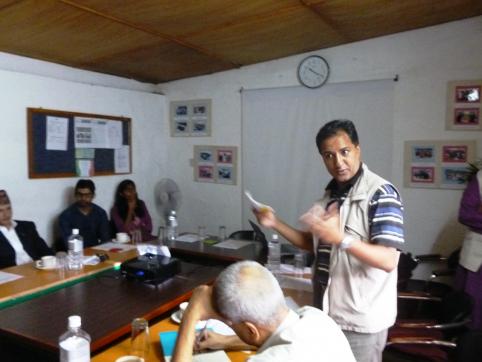This July, 20 representatives from the government, media, civil society, INGOs, academia and tech community gathered together in Nepal Open Gov Hub, Kathmandu for a roundtable discussion on open budget data. The event, co-hosted by AidData and Open Nepal, was the second ‘Open Data Working Group’ event, building on the success of the first one organized in February this year. The discussion revolved around the idea that open data key players in Nepal should focus on the demand for data when designing efforts to improve the supply of data, as demand for data and the supply of data are each other’s complement.

Representatives from the government, media, civil society, INGOs, academia and tech community in Open Budget Data Discourse
The role that persistent demands from citizens for better data could have in improving and increasing the supply of government data was iterated by Prakash Niroula from the Ministry of Finance. “When people start questioning and demanding for data, it puts pressure on the power holders, who in most cases are also the owners/producers of data, to provide better and timely data/information”.Greater demand for open data was seen by many at the Working Group as the key ingredient in improving its supply. As part of this it was viewed as very important to clearly identify open data end users in Nepal for realizing its potential value. Avigya Karki from Centre for Inclusive Growth stated that “when we know who we are catering to, we will be able to produce data that is responsive to their demand, and which makes more sense to them”.
The participants in the Open Data Working Group expressed that “there is availability of data, but accessibility is a problem”. When data is published in a format that is not open, there are many challenges associated with it. Data needs to be timely, accurate and detailed, and shared in a format that is easy for people to access and play around with. The importance of micro-level data was stressed, as disaggregated and categorical data can impact people’s lives at the ground level and was needed to close the loop between demand and supply of data. Bibhusan Bista from Young Innovations underscored that small data is where the real demand lies. “Ordinary citizens don’t understand the details of bulky data, and they would not be interested. What matters to them is the information/data that affects their daily life”.
There was a general recognition by members of the group that the time is right for the dialogue on open data in Nepal to move beyond making data accessible. According to Dr. Mahesh Banskota, Dean of Kathmandu University School of Arts, “open data initiatives, programs and users of data should focus on where and how to use the available data, and scrutinize them to identify striking gaps”. With regards to budget data, it is important to start using the data effectively to decipher what the budget does not say and what the government has not planned, rather than merely explaining what is in it. For such indications to be made from the data it should be in a format suitable for analysis - this is where data in open format plays a critical role by enabling people to freely and easily use data, helping them to make many different interpretations.
The creating of strong institutional memory was also highlighted as important to ensure that data is made available when there is a need. Banskota emphasized that “In government agencies when people are transferred, data goes with the person who was in-charge of managing it because there is no systematic way of archiving them”. Data portals are potentially a good way of addressing this, enabling systematic storing and managing data in a way that will improve its supply to the users.
The event provided a valuable opportunity for key stakeholders in Nepal’s open data ecosystem to share experiences of their successes and challenges in using budget data, and suggestions and ideas to improve the future supply and use of open budget data in Nepal. We hope this meeting of minds will help to make the effective use of open budget data a reality in Nepal.
